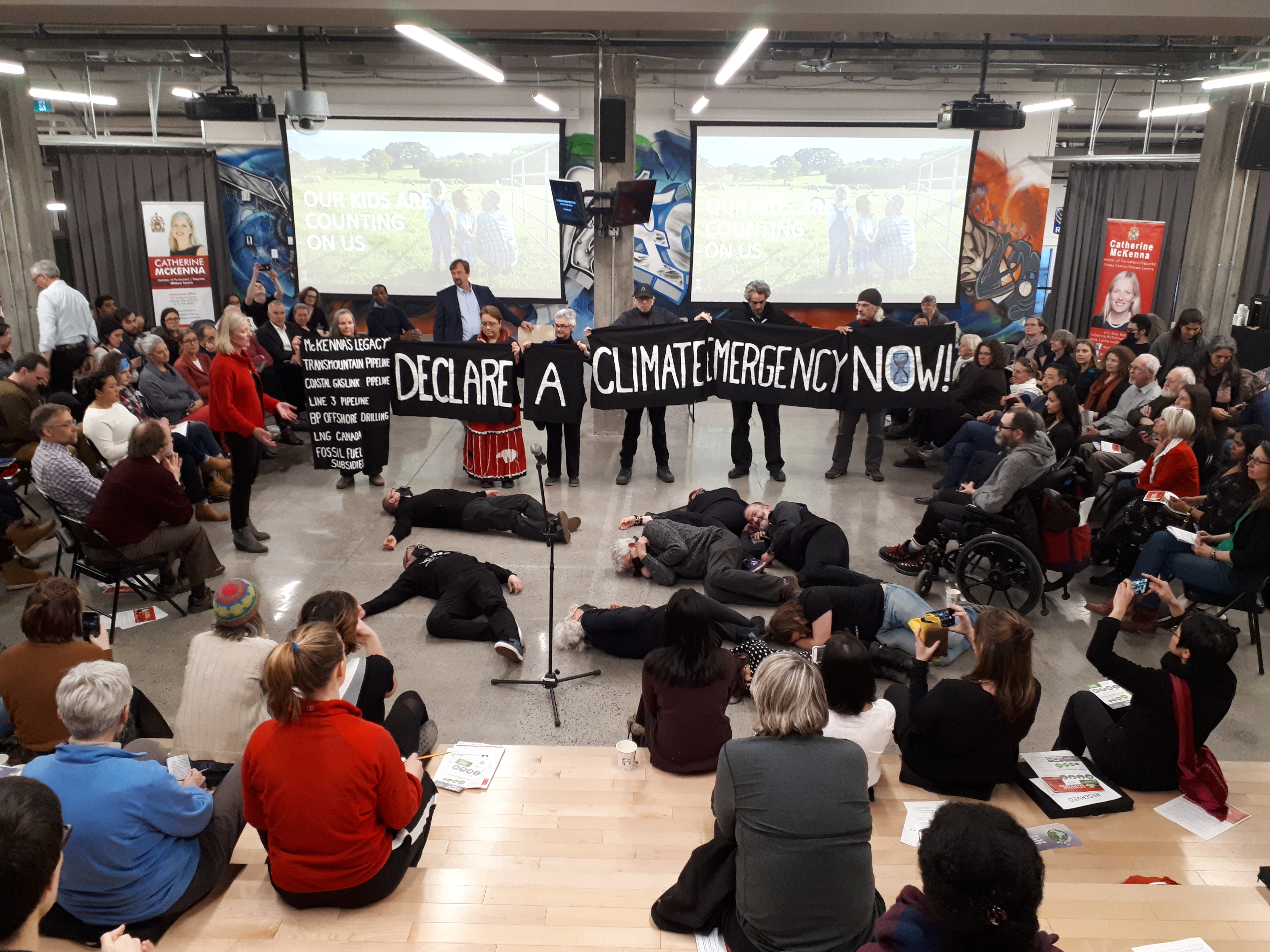Extinction Rebellion (XR) Ottawa recently called on federal Environment and Climate Change Minister Catherine McKenna, at a town hall meeting she held in her Ottawa-Centre riding, to declare a climate emergency and to stop approving fossil fuel megaprojects.
The Liberal MP had promoted the March 28 event as an opportunity for her “to hear from Canadians about climate action,” but the reality of how McKenna conducted the meeting fell well short of that invitation.
Less than 24 hours before the town hall took place, in a large dose of foreshadowing of what was to come, McKenna’s office emailed those who had registered online that there would be a “mandatory coat check on-site,” “no signs, banners or large bags permitted,” and that “if you have reserved more than two tickets” those names would need to be emailed to her office prior to the event.
And while they didn’t interfere with the protest that did unfold that evening, there were four armed officers with the Parliamentary Protective Service in attendance without any explanation for their presence.
For her part, McKenna was keen to tout her government’s climate record, build support for the federal carbon tax and to caution while people may not be entirely satisfied with her government that the Conservatives would be far worse for the climate.
In contrast, XR Ottawa — through a banner action and die-in — called on McKenna to declare a climate emergency and to take bold action given time is short (less than 12 years) to avert the compounded climate breakdown that would come with global temperatures increasing to 2 Celsius above pre-industrial levels.
McKenna’s spin can be summarized as the Liberals are ready to roll up their sleeves to do more to address climate change, that she’s up against Alberta and the Yellow Vests, and that she needs us marching on the streets.
All that seemed to fall flat given the fundamental reality that her government has had since October 2015 to take real action on the climate (and hasn’t), that polarization isn’t an excuse for not doing what science demands, that her stereotype of Alberta excludes Indigenous voices opposed to the tar sands on their territories, and that communities have been on the streets and yet her government still bought the Trans Mountain pipeline.
In response to a shout from those gathered at the town hall, McKenna stated that she did have “courage,” but by any measure her actions do not support that assertion.
For instance, the federal carbon tax, her climate policy centrepiece, is now $20 a tonne and is scheduled to rise to $50 a tonne in 2022. But Simon Fraser University economist Marc Jaccard has stated that the carbon tax in Canada would need to have started at $30 and rise to $200 a tonne by 2030 to meet the Trudeau government’s (weak) commitment under the Paris climate agreement.
McKenna’s government has also notably stalled on the critical 2015 election promise of phasing out Canada’s $3.3 billion worth of annual fossil fuel subsidies (a promise originally made by the Harper government at the G20 summit in Pittsburgh in 2009).
It’s hard to convey everything on a piece of painted fabric, but XR Ottawa highlighted many of these concerns on their “McKenna’s legacy” banner.
McKenna, as noted in this Facebook post, approved the 890,000 barrel per day Trans Mountain tar sands pipeline (that would cross Secwepemc territory without their free, prior and informed consent); the Coastal GasLink fracked gas pipeline (which militarized police violated Wet’suwet’en territory to begin pre-construction); the Line 3 pipeline (the 760,000 barrel per day pipeline that would have the capacity to carry diluted bitumen for 50-60 years); BP offshore drilling (by the transnational corporation responsible for the disastrous Deepwater Horizon oil spill in the Gulf of Mexico); LNG Canada (the liquefied natural gas export terminal that would be serviced by the Coastal GasLink pipeline); and fossil fuel subsidies (an estimated $3.3 billion a year on top of the $4.5 billion purchase price of the Trans Mountain pipeline).
McKenna’s response?
In a tweet posted after the event she noted, “I see you and I hear you, Ottawa Centre. Thanks for voicing your concerns tonight and sharing your passion with our community. Your questions were thoughtful and motivating. Keep working hard. Keep pushing us to move forward.”
Nice words, but no declaration of a climate emergency, no statement that she will accept the invitation from an Earth Strike organizer to participate in their September 27 action, no announcement to phase out fossil fuel subsidies, and no stepping back from her pipeline agenda (in fact she only brought out the tired trope that if we don’t build new pipelines it will only mean more oil by rail).
This is not climate leadership. This is not listening to Canadians and Indigenous peoples. This is a sad abdication of responsibility by Canada’s “environment minister.”
Brent Patterson is a political activist and writer.
Photo: Brent Patterson
Help make rabble sustainable. Please consider supporting our work with a monthly donation. Support rabble.ca today for as little as $1 per month!




